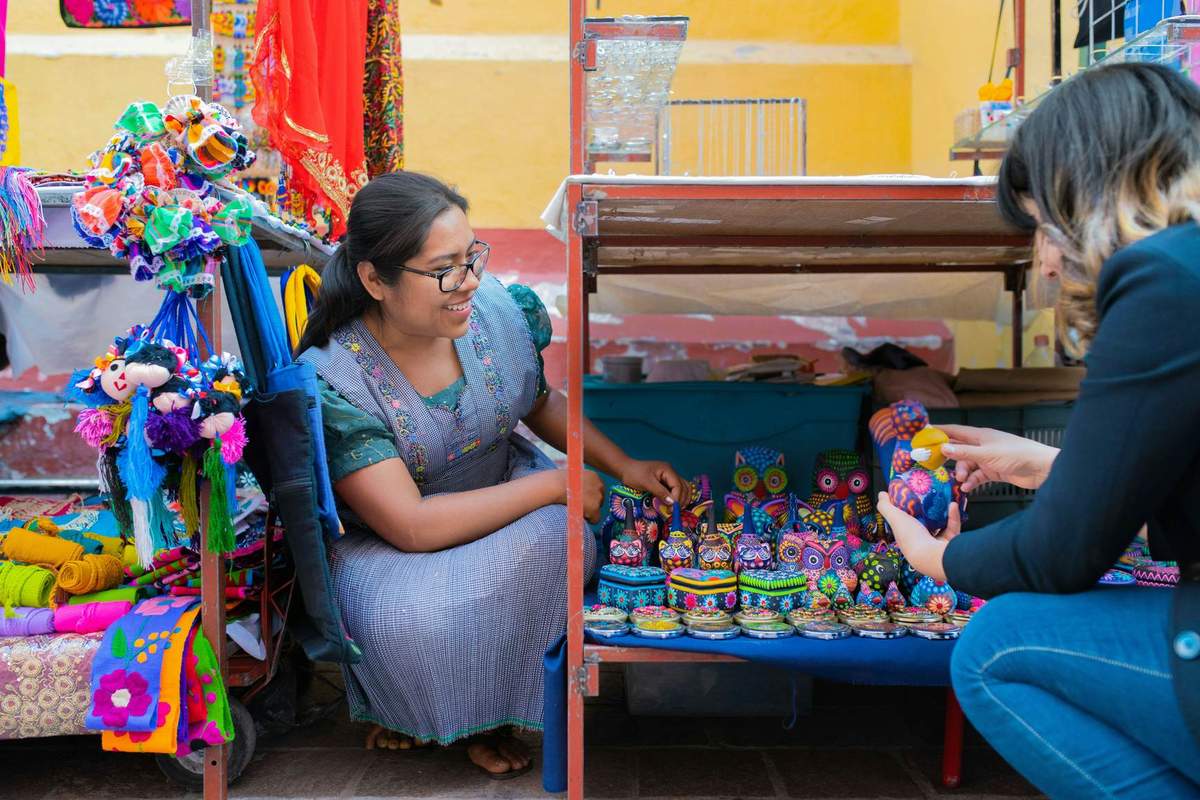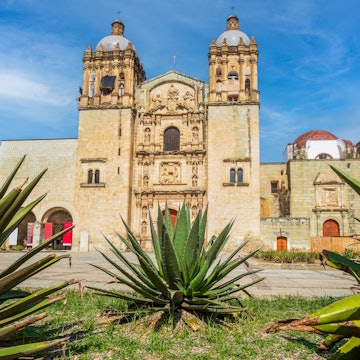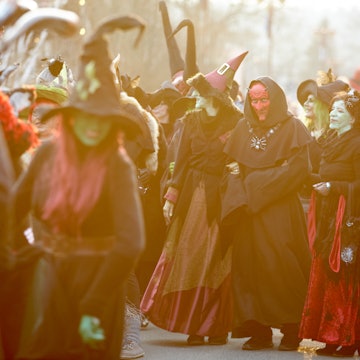

In every neighborhood of Oaxaca City, you’ll find lively art, delicious food and mezcal that packs a punch © Kelli Hayden / Shutterstock
Oaxaca City is a fascinating amalgam of vividly enchanting neighborhoods, some with a history older than the town itself and each with its own distinct personality.
Most visitors gravitate toward the Centro, the city’s busy historic center, famous for its striking colonial architecture, absorbing museums, exquisite arts and crafts, uniquely rich culinary scene and mezcal galore.
For a taste of Oaxacan life, wander through the nearby barrios of Jalatlaco and Xochimilco, two of Oaxaca’s oldest quarters, where today street artists have transformed aging buildings into colorful works of art.
Need a break from the city? Head for the verdant foothills of San Agustín Etla, a relaxed suburb of the capital city and a gateway to the beautiful countryside of Oaxaca state.
Here are some of the best neighborhoods to explore on your next visit to Oaxaca.

Centro is the best neighborhood to hang your hat
Oaxaca’s heart beats in the Centro. With a whopping 1200 historic monuments and an extraordinary concentration of restaurants, galleries and museums spread out across 247 blocks, the easily walkable downtown has well earned its Unesco World Heritage badge. Many of the best things to do in town can be found here.
For the classic Oaxaca market food experience, greet the new day with a rich chocolate atole (a sweet corn-based drink) and salsa de queso (cheese bathed in spicy red salsa) in the Mercado de la Merced’s Fonda Florecita.
After breakfast, mosey over to the Andador Turístico, a traffic-free pedestrian corridor where galleries and craft stores sell high-quality paintings, alebrijes (colorful wooden animal figurines) and hand-woven Zapotec rugs. Next, get cultured at the Museo de las Culturas de Oaxaca, a first-rate museum housing a treasure trove of ancient Mixtec and Zapotec artifacts. Finally, cap things off with a mezcal-tasting session imparted by the experts at Mezcaloteca.
When deciding where to stay, consider this centrally located area one of your best options as it’s not only jam-packed with sights but also with accommodations for all budgets, including such tasteful B&Bs as Casa de las Bugambilias and La Betulia.

Discover fabulous street art in Jalatlaco
The alluring Jalatlaco barrio is just a short distance from the downtown historic center – yet its quiet cobbled streets, quaint sidewalk cafes and unhurried pace give it the feel of a laid-back village.
Adding to its appeal, local street artists have transformed the community into an outdoor gallery of sorts with brilliantly painted murals adorning walls along the streets of Aldama, 5 de Mayo and Miguel Hidalgo. Look for the vivid Day of the Dead–inspired murals by Bouler; the work of this talented Oaxacan artist also graces the exterior of Casa Curtiduría, a character-filled hotel one block south of the 17th-century Templo de San Matías.
Discover the neighborhood’s many charms on foot, or hook up a street-art bike tour with Coyote Adventures, which rolls through Jalatlaco and nearby areas.
Soak up traditional flavors in Xochimilco
Another picturesque enclave known for its exploding urban art scene is the Xochimilco quarter, an important weaving district and one of the city’s oldest neighborhoods: it dates all the way back to the 15th century. In the heart of Xochimilco (the area just north of Hwy 190), you’ll come across cobblestone streets dotted with century-old textile workshops, small craft shops and restaurants specializing in regional Oaxacan cuisine, such as the praiseworthy Ancestral.
South of the highway, an iconic arched aqueduct runs along Callejón Rufino Tamayo amid the area’s growing number of upscale hotels, including the elegant colonial-style Casona de Tita.
The Xochimilco Aqueduct was built between 1727 and 1751 to bring fresh drinking water into downtown from the hills of Cerro de San Felipe. Though it ceased to operate in 1940, some of the arches are still used as entryways into homes. And if the structure looks familiar, that’s because it served as a location for the 2006 comedy Nacho Libre, starring Jack Black as a festively plump wrestler.

Live like a local in Reforma
What the middle-class Colonia Reforma neighborhood lacks in sights, it makes up for in convivial restaurants and bars. To tap into a friendly local scene, wet your whistle at the perennially packed Cantina El Otro Mundo, where each round of drinks comes with a complimentary – and surprisingly tasty – snack. Take it all in on the cantina’s patio area, which is decked out with quirky murals. For a quieter drink, duck into the nearby brewpub Consejo Cervercero to sample some of Oaxaca’s choicest craft beers.
Reforma also stands out for its family-run restaurants specializing in traditional Oaxacan fare. La Teca, a Oaxaca institution, prepares excellent regional cuisine such as garnachas istmeñas (fried tortilla snacks hailing from the sultry Isthmus of Tehuantepec region), while slow-food eatery Itanoni takes great pride in locally sourced corn-based appetizers, including white maize memelitas and triangular-shaped tetelas – all simple yet deliciously flavorful.
San Agustín Elta is the best area for getting away from it all
Even though restful San Agustín Etla is not actually within the city limits of Oaxaca, we would be remiss not to include one of the city’s top green getaways, only 11 miles northwest of downtown.
Most folks head to Etla to check out the superb exhibits, concerts and dance performances at the Centro de las Artes de San Agustín, a 19th-century textile factory that has been lovingly converted into a modern arts center. But the low-key community in the Sierra Madre foothills also spoils visitors with its verdant gardens, cascading waterfalls, soulful Day of the Dead festivities and an open-air Sunday food market that makes drool-worthy tamales and memelitas.
Should you decide to stick around for a night, Casa Maria’s well-appointed adobe rooms make for a comfortable, affordable stay. And if you’re up for a short hike after breakfast, hit the nearby Aqueduct Trail for expansive views of the surrounding mountains.
You might also like:
When to visit Oaxaca for festivals, food and fun
10 things to know before going to Oaxaca, one of Mexico's most intriguing destinations
Top things to do in the culturally rich Oaxaca City
















